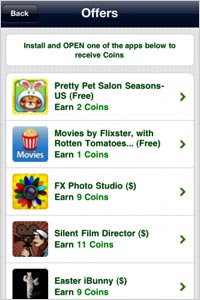Most Users Reject Incentivized Downloads
- by Mark Walsh @markfwal, December 13, 2011
 Incentivized downloads have proven a controversial, if widespread, method for increasing distribution of mobile applications by developers. The idea
is that someone using a game or other type of app is rewarded with virtual currency or points in return for downloading another app.
Incentivized downloads have proven a controversial, if widespread, method for increasing distribution of mobile applications by developers. The idea
is that someone using a game or other type of app is rewarded with virtual currency or points in return for downloading another app.
Apple banned apps running incentivized offers from the App Store because the practice, in effect, allows developers to buy their way up the crucial app rankings by spending heavily to promote their titles that way.
A new survey by Harris Interactive on behalf of lead-generation ad firm Pontiflex casts more doubt on the incentivized model. It suggests that only 3% of smartphone owners who have downloaded an app for unrelated rewards ended up using the app often. Among the rest, 62% uninstalled or never used the app after redeeming the incentive, and 17% “hardly ever” used it.
“With incentivized downloads, you can get a quick spike, but it’s not a good way to build long-term relations with consumers,” said Zephrin Lasker, CEO of Pontiflex, which provides an in-app platform that allows people to sign up for more product information in ads without the inducement of unrelated offers.
Then again, some developers might not frown on an incentive-based campaign resulting in 3% of those exposed becoming frequent users and 17% trying a new app, depending on the cost.
Still, because the free, ad-supported model is the way most people get apps, Lasker emphasized that the in-app ad experience should be as user-friendly as possible to avoid alienating the bulk of users with gimmicky ad approaches. The Harris survey found that 57% of smartphone owners and half of tablet users prefer free apps with ads that don’t pull them away to a mobile browser.
The list of top-ranked Android apps published Monday by Nielsen also underscored the predominance of free apps. Part of the problem with mobile advertising, according to Lasker, is that marketers are attempting to fit traditional online ad models to mobile media.
In that vein, a Harris poll that Pontiflex released at the start of the year suggested that nearly half (47%) of app users are more likely to click an ad accidentally than on purpose. The upshot: clicks are not necessarily the best metric for measuring mobile advertising.
The new study raises questions about the effectiveness of mobile video advertising. Only 7% of smartphone users who have downloaded free apps and 15% of tablet users who have downloaded free apps would prefer to watch video ads that take over the screen. Furthermore, about 35% of smartphone and tablet owners are concerned that mobile video ads will raise the cost of their service plans because of the additional bandwidth use.
Data released by mobile video provider Rhythm New Networks this month reported that interactive pre-roll video ads -- appearing when an app launches, between game levels and other screens -- had completion rates of 17.9% on average, and 27% on premium media properties.
The Harris survey for Pontiflex was conducted from Nov. 10 to Nov. 14 among 2,810 adults ages 18 and older, among whom 958 were smartphone users and 257, tablet owners.


